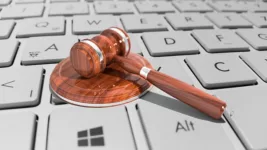One of the interesting things that appears to be happening during the Pandemic is that it forces companies and government entities to revolutionize how they interact, how they treat and provision employees, and how they serve their customers. The US Judicial system has been in the news a lot by seeming increasingly biased and treating those that depend on it unfairly. A good deal of the problem is that courtrooms were poorly provisioned; judges are overworked and under-supported. The aging litigation process seems to favor antiquated methods that make it inefficient and unfair, particularly to both plaintiffs and defendants at risk, members of minorities, or in financial distress. These problems appeared to expand a great deal during the Pandemic.
Courts are far from the only troubled area. The US’s legislative processes were designed around in-person events where the members voted on topics often without technical support or capability to explore arguments in real-time. The Pandemic blew this up. It is somewhat ironic that the solutions now being used by the government have shifted to things like electronic voting currently being denied to citizens. However, I expect that this use of electronic voting by the US Legislator will help shift perceptions to allow for citizen electronic voting at scale in the future.
This week Cisco stepped up with a focused solution that addresses many of these problems that likely wouldn’t have resulted had it not been for the Pandemic. This focused solution is increasing numbers of silver linings to the Pandemic Cloud that we continue to suffer through.
Let’s explore how the Pandemic is resulting in changes to the litigation process both in the US and likely globally, thanks to the Pandemic.
Legislative Support
The need was to create a solution that allowed for governing bodies to meet virtually at scale. These solutions had to be secure to preserve these meetings’ privacy and assure they aren’t interrupted or influenced by outside entities. It had to include the capability of reliably assuring those attending should be in the meeting but that the tool used didn’t materially impact the session’s outcome.
Cisco created Webex Legislate, a secure video collaboration solution that can be used in a hybrid fashion supporting remote and remote members and those on-premise and allows for both collaboration and reliable voting. This solution not only protects the members of the legislator, the majority of which are in high-risk groups but assures both a record of the event (which can be shared when needed) and a viable method to capture the arguments and positions of attendees.
This powerful solution should improve the legislative process and better assure that those that might previously have been overlooked to have their voice heard and, even after the Pandemic, to better link it remote members so that the legislative process is more inclusive to its members who may have health issues or need to deal with events and campaigns remotely.
Judicial Support
As noted above, the Judicial System in the US is under stress and attack. Judges are too often poorly equipped to do their job, lack necessary resources, and are put at physical risk by defendants and attendees that act out.
Cisco’s new Connected Justice Solution for Courts, Correctional Facilities, and Community Corrections not only addresses the needs that have come up during the Pandemic but many of them that existed before the Pandemic as well.
With this solution, witnesses, plaintiffs, and defendants can participate remotely. This remote capability not only protects their health and personal safety, but it also provides for a far more convenient way to participate in the court process without having to sacrifice their job completely or home needs. With families struggling with balancing jobs and kids studying from home, adding a litigation component is overwhelming. By allowing people to also participate in the court process remotely, they are far better able to balance these conflicting needs while stepping up to the court’s needs and their civic duties as juries or witnesses.
This ability to attend remotely also removes a great deal of stress from the Judges who can better focus on the case and not on the distractions from poorly equipped courtrooms or critical participants that can’t safely and reliably attend. And it is cost-saving because criminal defendants that are incarcerated can be video conferences in removing the need for secure transportation and delivery of that defendant to the courtroom. Finally, family and friends, wanting to provide support for their friends and relations in the courtroom but lacking time to travel to the event can participate remotely and better provide the emotional support often critical to the mental health of those involved in the litigation process.
This solution is another offering that has significantly improved a government process that likely wouldn’t have existed for years had it not been for the Pandemic.
Wrapping Up:
There is an old saying (dated 1546) that translates to “it’s an ill wind that blows nobody any good.” The Pandemic is a horrible event, but it has a positive impact by forcing companies and institutions to advance their Digital Transformations massively. One of the most powerful is the realization that government and courtrooms need to adapt remote tools so that these critical government functions can safely execute their duties. Cisco stepped up to the problem providing focused solutions for both functions and not only addressed the current problem but laid a foundation for a safer future in both courts and government.
We could well be seeing the foundational elements to creating on-line voting and a level of government inclusion and effective democracy that hasn’t even been possible before.







